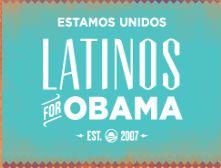Politics & Government
Election 2012: Obama's “Non-Cuban Hispanic” Saviors

It’s a curious feeling, this brown-becoming, the “Latino vote” hurling itself over the fence as it were, saving Barack Obama from the ignominy of becoming the first black president to lose a reelection bid. I’ve been writing about the potential of the Latino vote going on three decades, and although we’ve had inklings of what kind of power it can wield (such as when it modestly pushed a few swing states toward George Bush in 2004), this time it’s at the center of the electoral narrative.
There was George Will on ABC, minutes after the election was called, talking about how Barack Obama could now put “immigration reform front and center, giving the Republicans a reef upon which they can wreck themselves.” Brian Williams and all the old school network anchors welcomed the “non-Cuban Hispanic” cohort (read: Mexicans, Central Americans, Puerto Ricans) to the national story.
It’s a curious feeling because, notwithstanding the astonishing exit polls (up to 75 percent of the Latino vote went for Obama, providing decisive margins in several of the battleground states), we are still on the margins policy-wise. For the last four years we’ve endured the moral and political disaster of the Obama administration’s immigration policy—record numbers of deportations and the consolation prize of a Dream Act Lite via executive order. Latin America policy in general is in disarray and Obama’s other great failure is the drug war we share with Mexico, which continues unabated with billions of dollars in American support—and is completely absent from national political discourse despite 80,000 dead.
I’ve spent the last dozen years living in, and writing about the desert West and borderlands. Ground zero of the housing boom and bust, home to nativist reaction (Arizona), a landscape transformed by climate-change-sparked infernos, a place simultaneously growing ever-more diverse (especially with “non-Cuban Hispanic” types) and segregated (the desert version of the “one and the ninety-nine,” migrants dying of thirst within sight of the gentry’s adobe chalets).
The West is like any other place in the country, except more so. The brown cowboys and girls are now seated around the campfire, but just behind George Will and Brian Williams, shadows dancing on their faces.
Rubén Martínez is the author of Desert America: Boom and Bust in the New Old West and professor of literature and writing at Loyola Marymount University.
-

 Latest NewsApril 3, 2024
Latest NewsApril 3, 2024Tried as an Adult at 16: California’s Laws Have Changed but Angelo Vasquez’s Sentence Has Not
-

 Latest NewsApril 17, 2024
Latest NewsApril 17, 2024Despite Promises of Transparency, California Justice Department Keeps Probe into L.A. County Sheriff’s Department Under Wraps
-

 Latest NewsMarch 20, 2024
Latest NewsMarch 20, 2024‘Every Day the Ocean Is Eating Away at the Land’
-

 State of InequalityApril 4, 2024
State of InequalityApril 4, 2024No, the New Minimum Wage Won’t Wreck the Fast Food Industry or the Economy
-

 State of InequalityApril 18, 2024
State of InequalityApril 18, 2024Critical Audit of California’s Efforts to Reduce Homelessness Has Silver Linings
-

 State of InequalityMarch 21, 2024
State of InequalityMarch 21, 2024Nurses Union Says State Watchdog Does Not Adequately Investigate Staffing Crisis
-

 Latest NewsApril 5, 2024
Latest NewsApril 5, 2024Economist Michael Reich on Why California Fast-Food Wages Can Rise Without Job Losses and Higher Prices
-

 Latest NewsMarch 22, 2024
Latest NewsMarch 22, 2024In Georgia, a Basic Income Program’s Success With Black Women Adds to Growing National Interest




















